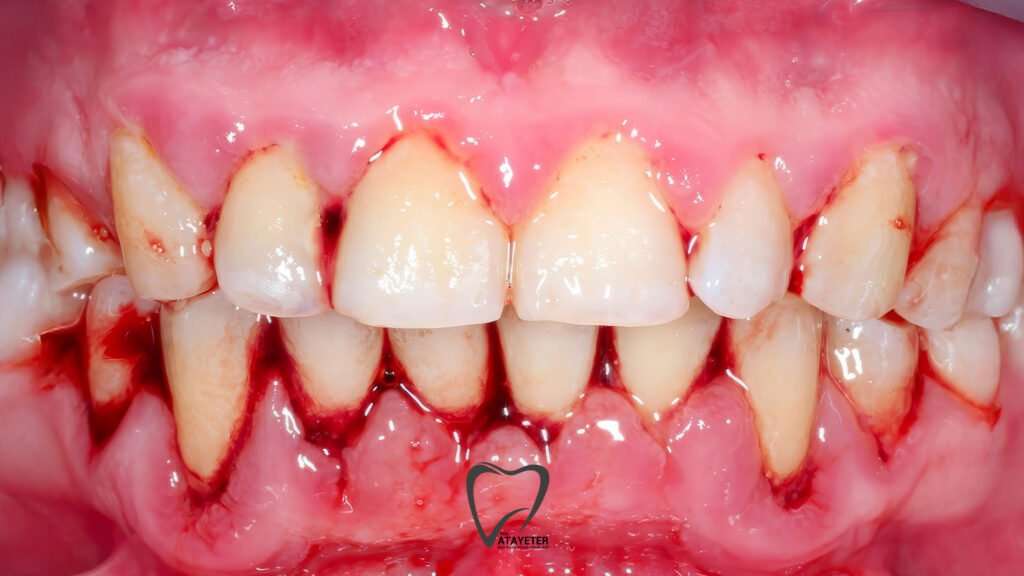When talking about oral and dental health, most people think only of their teeth. Bright, white, and straight teeth are often the primary focus, but the true heroes in keeping teeth strong and healthy are their gums. Gums are the tissues that surround, support, and protect teeth and are an invisible yet vital part of dental health. Without healthy gums, it’s nearly impossible for teeth to function for many years. Therefore, the condition of their gums directly affects not only oral health but also their overall health.
When gums become inflamed or diseased, the symptoms can often be subtle and difficult to detect. Mild redness, tenderness, or bleeding are often overlooked by many. However, these early warning signs can be signs of more serious problems later on. Gum disease often progresses insidiously; if left untreated, it can lead to permanent damage, including tooth loss. Furthermore, research shows that gum disease may be linked to heart health, diabetes, and certain chronic diseases. This demonstrates that gums play a critical role not only in the mouth but also in the overall health of our bodies.
What are Gum Diseases?
Gum disease is an invisible yet critical part of our oral health. It typically occurs as a result of inflammation or infection of the gums and often progresses insidiously. These diseases are generally categorized into two main groups: gingivitis and periodontitis.
Gingivitis (Inflammation of the Gum):
Gingivitis is the starting point of gum disease. It manifests itself with symptoms such as mild redness, swelling, and bleeding during brushing. Many people ignore these symptoms because they are usually painless. However, if gingivitis is detected early, it is completely reversible and can be controlled with simple oral hygiene practices. Regular brushing, flossing, and professional dental cleanings help restore gum health at this stage.

Periodontitis (Advanced Gum Disease):
If gingivitis is left untreated, inflammation in the gums progresses and It can develop into a more serious condition called periodontitis. At this stage, the gums begin to recede, teeth become loose, and jawbone loss can occur. If left untreated, tooth loss can become inevitable. Periodontitis doesn’t just cause oral problems; research shows that this disease may be associated with heart disease, diabetes, and some chronic systemic diseases.
In short, gum health affects not only our smile but also our overall health. Noticing even the slightest changes in gums, regular dental checkups, and proper oral hygiene habits can help prevent disease. Remember: healthy teeth start with healthy gums.
Causes of Gum Disease
Gum disease usually doesn’t occur for a single reason; the risk increases when multiple factors come together. Here are the most common factors that strain the gums and increase the risk of disease:
Poor Oral Hygiene
When teeth aren’t brushed or flossed enough, plaque and tartar begin to accumulate in the mouth. Plaque is the primary cause of gum inflammation and often progresses silently. Regular and correct brushing and flossing are the simplest yet most effective ways to protect your gums.
Smoking and Alcohol Use
Smoking reduces blood flow to the gums, making it harder for tissues to heal. It also weakens the immune system, reducing resistance to infection. Alcohol can also negatively affect oral flora and make oral health more vulnerable. Therefore, smoking and alcohol are among the main triggers of gum problems.
Hormonal Changes
Changes in hormone levels during periods such as pregnancy, menstruation, or menopause can make gums more sensitive. During this period, symptoms such as redness, swelling, or bleeding in the gums may occur more frequently. Knowing that hormonal changes affect the gums makes it easier to take precautions.
Genetic Predisposition
Some people are naturally more susceptible to gum disease. People with a family history of gum problems are at higher risk. Genetic predisposition can be mitigated with regular checkups and careful oral hygiene.

Chronic Diseases
Diabetes, heart disease, or immune-related disorders can directly affect gum health. These diseases reduce the gums’ resistance to infection, facilitating inflammation.
Stress and Nutrition
Intense stress and an unbalanced diet weaken the body’s overall resistance and affect the gums’ defense mechanisms. Not getting enough vitamins and minerals lowers immunity and can trigger gum problems.
Symptoms of Gum Disease
Gum disease usually progresses slowly, and in the early stages, there may be no obvious symptoms. However, with careful observation, some signs can be noticed.
Redness, swelling, and tenderness of the gums
Bleeding during brushing or flossing
Persistent bad breath or unpleasant taste in the mouth
Receding gums, teeth that are too long
Loose teeth or gaps between teeth
Jaw pain or a feeling of fullness in the mouth
How is Gum Disease Treated
Gum disease can be controlled with appropriate treatment; however, the method used varies depending on the degree of disease progression. For mild gingivitis, a professional dental cleaning is usually sufficient; this procedure, performed by a dentist, reduces inflammation by removing plaque and tartar. If the disease has progressed to the level of periodontitis, deep cleaning methods such as root planing are applied. This procedure cleans the pockets under the gums and prevents the spread of infection.
In some cases, medication can also be used as a supplement; antibiotics, anti-inflammatory medications, or special mouthwashes help control the inflammation. In more advanced stages, surgical interventions may be necessary; procedures such as gum tissue reshaping or bone grafting protect both the teeth and surrounding tissues.

Ways to Prevent Gum Disease
Some simple but effective measures can be taken to protect gum health and stay disease-free:
Brush and floss at least twice a day
Attend regular dental checkups
Limit smoking and alcohol consumption
Eat a balanced diet, especially foods rich in vitamins C and D
Managing stress and paying attention to your sleep patterns
Avoiding hard and sticky foods and protecting your teeth
Atayeter Oral and Dental Health Polyclinic









